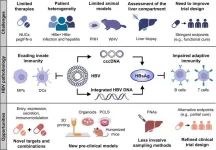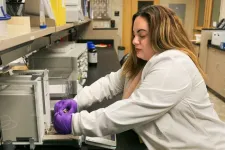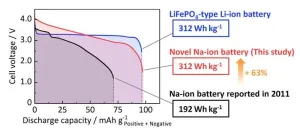(Press-News.org) Strategy underlies the affairs of national leaders, including how they view and interact with other states — but what if such strategy is borne of self-deception? That’s the thrust of a novel international relations theory that Ryuta Ito of Hiroshima University has now expanded upon, providing psychological rationalization to explain the irrational acts of national leaders at war.
Ito penned his reasoning on Sept. 5 in the journal International Affairs.
“Why did Vladimir Putin decide to invade Ukraine in 2022?” asked Ito, assistant professor in the Graduate School of Humanities and Social Sciences at Hiroshima University. “Some international relations scholars regard it as a preventive war with a strategic rationale in response to NATO's eastward expansion. However, as many other scholars suggest, Putin's decision-making is riddled with various irrationalities, which can be better framed as overbalancing and the classical realist concept of ‘hubris’ — or overconfidence.”
In international relations theory, Ito said, Putin’s invasion of Ukraine could be regarded as balancing if the target had aggressive intentions. Instead, the invasion is an example of overbalancing: Ukraine and the West aimed to strengthen defensive positions, but Putin deceived himself into believing the moves were hostile threats to Russia, triggering an “unnecessarily costly and dangerous arms spiral” between Russia and others.
“Introducing self-deception into international relations is essential, because self-deception can explain various important cases of overbalancing within a single conceptual framework,” Ito said, noting that other cases include the Hitler’s atrocities and the United States’ failures with regard to the Vietnam War.
Sir Lawrence Freedman, Professor Emeritus of War Studies at King’s College, London, and a historian and expert in international affairs and foreign policy, first proposed the idea that Putin’s self-deception led to his overconfidence. This understanding introduced the evolutionary psychology concept of self-deception into classical realism, the international relations theory that argues individual states are inherently human-based and, as such, act in their own self-interests.
But, if states act in self-interest and self-preservation, Ito asked, why do leaders sometimes act in ways that put the state at risk — such as Putin launching an attack against Ukraine? In this study, Ito used this example as a “plausibility probe” to empirically demonstrate that hubris can lead to overbalancing.
“Despite its importance, realists have been unable to theorize hubris on robust foundations because they ignore scientific research on self-deception,” Ito said. “In other words, they have not scientifically explained what hubris is and why or how hubris causes overbalancing. This article aims to fill the gaps by constructing a novel balancing concept, namely ‘hubris balancing’ — irrationally aggressive balancing that is a form of overbalancing, in that it exceeds what is achievable in practice — through introducing self-deception into classical realism.”
Self-deception is the psychological mechanism of denying the significance, relevance or importance of opposing evidence and logical arguments, Ito explained. Humans evolutionarily used self-deception to underestimate vulnerability to various risks while overestimating their power over certain events. Such over- and underestimations extend to the importance of groups they belong to and to the abilities of others, respectively.
“In politics, such tribalistic aspects of self-deception often make leaders incite exclusive nationalism to overcome mobilization hurdles,” Ito said. “The higher the degree of self-deception, the more exclusionary nationalism becomes: the stronger the self-deception, the greater the orientation towards ethnic nationalism over civic nationalism.”
According to Ito, self-deception becomes a rhetorical tool for political persuasion.
“If leaders can deceive themselves into believing that they are telling the truth, they can effectively persuade others, including in-group and out-group members,” Ito said. “More specifically, driven by overconfidence and anger against hostile ideology, leaders often engage in overbalancing by driving exclusive nationalism.”
Ito noted that Putin’s military invasion is less about rational calculations concerning national interests and more about patriotic impulses to restore Russian historical unity.
“We can infer that rather than a cold geopolitical calculus, as structural realism posits, it was an exclusive nationalism derived from self-deception that was the driving force behind Putin’s war on Ukraine,” Ito said. “The key here is the civic and ethnic divide of nationalism… In the decade leading to the war against Ukraine in March 2022, Putin’s self-deception was strengthened to embrace more exclusive nationalism. Thus, the timing of the war is not necessarily a coincidence but more likely the result of the growing manifestation of Putin’s self-deception, producing aggressive nationalism.”
Next, Ito said he plans to examine other cases typical of hubris balancing, such as Lyndon B. Johnson’s administration involvement in the Vietnam War.
“Putin and Johnson are just two of many examples available: self-deception plays a pivotal role in international affairs, particularly in conflict situations, and is crucial to solving the puzzle of overbalancing,” Ito said. Based on the latest psychological findings, this article argues that self-deception is the single essential factor — the overarching cause of overconfidence, anger and exclusive nationalism — in explaining deviations from rational balancing behaviors.”
###
About Hiroshima University
Since its foundation in 1949, Hiroshima University has striven to become one of the most prominent and comprehensive universities in Japan for the promotion and development of scholarship and education. Consisting of 12 schools for undergraduate level and 4 graduate schools, ranging from natural sciences to humanities and social sciences, the university has grown into one of the most distinguished comprehensive research universities in Japan. English website: https://www.hiroshima-u.ac.jp/en
END
Self-deception may seed ‘hubris balancing,’ leading to Putin’s war against Ukraine
2023-11-13
ELSE PRESS RELEASES FROM THIS DATE:
Appropriate statin prescriptions increase sixfold with automated referrals
2023-11-13
PHILADELPHIA— The odds of prescribing the appropriate dose of statins—a medicine used to lower “bad” cholesterol levels—increased sixfold when automated referrals were made to pharmacy services, instead of relying on traditional prescribing methods, according to researchers at the Perelman School of Medicine at the University of Pennsylvania. More than 90 million people in the U.S. use statins, making it one of the most prescribed medications in the county. Despite their effectiveness in lowering cholesterol levels and the risk of cardiovascular ...
When keeping secrets could brighten your day
2023-11-13
Though people often want to share good news as soon as they learn it, a study published by the American Psychological Association has found that keeping good news a secret before telling someone else could make people feel more energized and alive.
“Decades of research on secrecy suggest it is bad for our well-being, but this work has only examined keeping secrets that have negative implications for our lives. Is secrecy inherently bad for our well-being or do the negative effects of secrecy tend to stem from keeping negative secrets?” asked lead author Michael ...
It takes a village: Hunter-gatherer approach to childcare suggests that the key to mother and child wellbeing may be many caregivers
2023-11-13
Infants and toddlers may be psychologically wired to thrive with high levels of “sensitive care” and personal attention, according to a study conducted with contemporary hunter-gatherer societies.
Research led by an evolutionary anthropologist at Cambridge University found that hunter-gatherer infants receive attentive care and physical contact for about nine hours per day from up to 15 different caregivers.
Dr Nikhil Chaudhary says that, for the vast majority of our species’ evolutionary history, ...
The American Pediatric Society announces its new members for 2023
2023-11-13
The American Pediatric Society (APS) is pleased to announce eighty-four new members. Founded in 1888, the APS is North America's first and most prestigious academic pediatric organization. New members will be recognized during the APS Presidential Plenary at the Pediatric Academic Societies 2024 Meeting.
APS members are recognized child health leaders of extraordinary achievement who work together to shape the future of academic pediatrics. Current members nominate new members by recognizing individuals who have distinguished themselves as child health leaders, ...
Reviewing new challenges and opportunities for hepatitis B cures
2023-11-13
Hepatitis B virus (HBV) is a significant public health problem, with over 296 million people chronically infected worldwide. Despite the availability of a safe and effective vaccine for over 40 years, HBV remains a leading cause of liver disease and death.
One of the main challenges to curing HBV is the unique biology of the virus. HBV replicates through a covalently closed circular DNA (cccDNA) intermediate integrated into the host genome. This makes it very difficult to eradicate the virus completely, even with effective antiviral therapy. Another challenge is the impaired immune response to HBV in chronically infected individuals. The virus has evolved several mechanisms to evade ...
AI faces look more real than actual human face
2023-11-13
White faces generated by artificial intelligence (AI) now appear more real than human faces, according to new research led by experts at The Australian National University (ANU).
In the study, more people thought AI-generated white faces were human than the faces of real people. The same wasn’t true for images of people of colour.
The reason for the discrepancy is that AI algorithms are trained disproportionately on white faces, Dr Amy Dawel, the senior author of the paper, said.
“If white AI faces are consistently perceived as more realistic, this technology could have serious implications for people of colour by ultimately reinforcing ...
Forming ice: There’s a fungal protein for that
2023-11-13
The way ice forms is a lot more interesting than you think. This basic physical process, among the most common in nature, also remains somewhat mysterious despite decades of scientific scrutiny.
Now new research from the University of Utah, with Germany’s Max Plank Institute for Polymer Research and Idaho’s Boise State University, is shedding fresh light on the role of biological agents—produced by fungi of all things—in ice formation.
Contrary to what we have been taught in school, water won’t necessarily freeze at 0 degrees Celsius (32 degrees F) because of the energy barrier ...
TTUHSC’s Wilkerson to investigate links between pain and basal sex hormone levels
2023-11-13
For most patients, acute pain following a surgical procedure is a common and expected hurdle which is eventually cleared during recovery. However, there is a small but significant patient population that experiences chronic post-surgical pain that may linger for six months or longer.
Sex hormones (e.g., estrogen in females and testosterone in males) are generally regarded as contributors to post-surgical pain development and maintenance, and basal sex hormones are the range of sex hormones expected to be produced in a healthy individual at any point in time. When basal sex ...
Template for success: Shaping hard carbon electrodes for next-generation batteries
2023-11-13
Lithium-ion batteries (LIBs) are, by far, the most widely used type of rechargeable batteries, spanning numerous applications. These include consumer electronics, electric vehicles (e.g., Tesla cars), renewable energy systems, and spacecrafts. Although LIBs deliver the best performance in many aspects when compared to other rechargeable batteries, they have their fair share of disadvantages. Lithium is a rather scarce resource, and its price will rise quickly with its availability going down in the future. Moreover, lithium extraction and improperly discarded LIBs pose huge environmental challenges as the liquid electrolytes commonly used in them are toxic and ...
New beetle species has bottle-opener shaped genitalia: Now that calls for a Carlsberg!
2023-11-13
Penises are more prevalent in some lines of work than others. And for researchers who study biodiversity of insects, penises play a significant role in their daily workload – for good reason.
"Genitalia are the organs in insects that evolve to be different in every species. As such, they are often the best way to identify a species. That's why entomologists like us are always quick to examine insect genitalia when describing a species. The unique shape of each species’ genitals ensures that it can only reproduce with the same species," explains biologist Aslak Kappel Hansen of the ...




